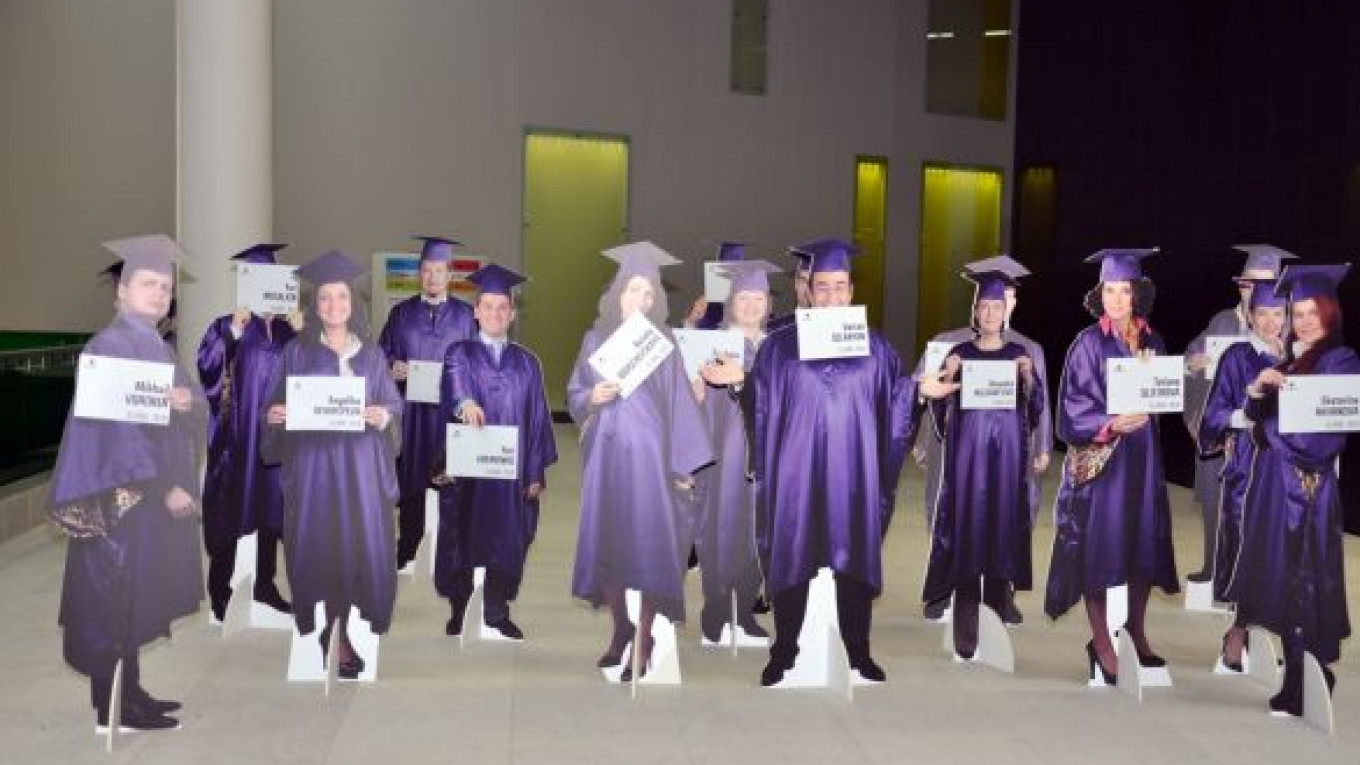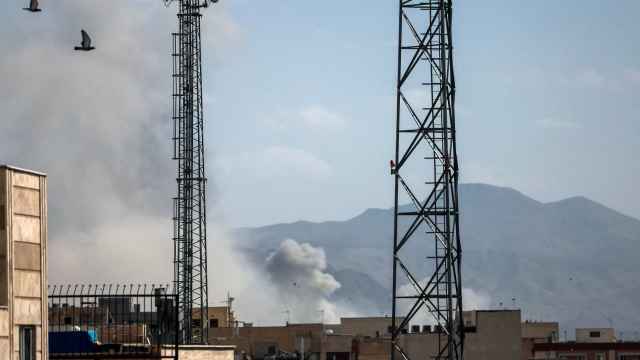SKOLKOVO, Moscow Region — Why do people go to business school? You might say you want the right to put a nice title on your business card. Eventually, you will get to give the business card to many rich people. Photographers will take pictures of you, and reporters will ask questions. And then, if you're really lucky, someday you will get to meet the president.
Now, what if there was a school where all of this happened backward? Right through the door, the president hands you a student ID as cameras flash. Reporters stick their voice recorders in your face as the country’s richest people grin and top government officials promise to drop by often to offer advice.
Then, you get your business cards. And what exactly is your title? “MBA student." By the second day, you will have achieved everything that is usually viewed as a long-term goal of business education — not because you went to school, but just because you came to school.
This is how education plays out at the Skolkovo School of Management, where all of the above has already happened to its first two intakes of MBA students. Full-time MBA students do much less studying than anywhere else, spending just 11 weeks in the classroom studying eight core business subjects found in most MBA programs, plus Macroeconomics, which is treated as a pre-requisite in most Western business schools.
Any visitor familiar with conventional education would be amused — in the United States, an MBA requires at least two years of full-time schooling. In Europe, students usually spend at least one year in the classroom.
"That is a common misperception about our program," said Skolkovo dean Wilfried Vanhonacker, who used to teach at the Columbia and INSEAD business schools. "These four months of class work are not all the knowledge the students get. They are a basis for receiving that knowledge further down in the program. We just use a different method to deliver it."
Vanhonacker insisted that while in traditional business schools much of the classroom time is spent studying cases, Skolkovo simply takes it to the next level, using real-life projects in various parts of the world as the same cases, except life-size.
This stretches the students' MBA program to 16 months. The tuition is 60,000 euros ($81,000), which includes on-campus housing and travel expenses throughout this time. Executive MBA students get away with much less. Their course includes one four-day weekend a month, or 64 study days in total. They do not get away for less though — the tuition of 90,000 euros amounts to some 1,400 euros per day.
Skepticism toward the Skolkovo school, which at first glance seems to be all about publicity and not substance, could be well understood.
At the school's four-year anniversary ceremony last week, VIPs and the media toured a shiny, new campus, complete with women in tight green alien suits and life-size cardboard cutouts of Skolkovo’s first graduates, the Executive MBA class that received their diplomas that day. Of the many glossy catalogs handed out to the press, one said school entrants were required to have a “fluent knowledge of English," while another listed members of its "Advisary Bord."
So what brought these people to Skolkovo instead of Harvard, the London School of Economics, INSEAD or any other business school? Many students interviewed by The Moscow Times identified networking opportunities within Russia as their primary reason for choosing Skolkovo.
Alexei Nazarov is an MBA student of the second intake who just started this month. He speaks fluent English, has a degree in economics and finance from St. Petersburg State University, a CCA accounting qualification and a few years at KPMG under his belt. He said it is all about whether one’s career aspirations lie within Russia.
“Harvard is great if you want to live and work in the West, but how many people from each year’s Harvard class return to Russia and work here? Maybe 10?" he said. "Here, we already have a network of 37 professionals who are going to be the business leaders tomorrow. If you are going to live and work in Russia, there is simply no alternative to Skolkovo.
"Most of our students are seasoned professionals, and we can learn from each other just as much as we can learn from any teacher,” Nazarov added, beaming. The average age of the students in his class is 27.
Considering that business itself is an imported activity in this land of recent socialism and five-year plans, you might wonder what sort of Russian-specific aspects of business you can learn. First Deputy Prime Minister Igor Shuvalov unwittingly delivered one example in his speech during the Executive MBA graduation ceremony last week.
“Roman Abramovich had this land plot, and it was valued at $200 million,” Shuvalov said, referring to the 26.5-hectare plot where the new Skolkovo campus is located, just a few kilometers southwest of Moscow's city limits. “Then he came to me, and I persuaded him to contribute this land to the future campus of this school, valuing it at just $5 million.”
There is also a bright side. Full-time MBA students are required to live on campus because classes during those 11 weeks run from dawn to dusk. This adds up to roughly the same amount of hours per subject as a student in a conventional school would get over a semester. The classes are taught in English by visiting professors from major universities in the United States and Europe.
During a recent visit to the macroeconomics class, the students were using formulas and functions to discuss how the Chinese government’s policy to increase savings reflected on the exchange rate of the yuan currency.
But the question remains whether the knowledge from an entire subject can be absorbed by students in such a concentrated form and what assessment methods can be used under such conditions.
Assessment is what separates academic programs from corporate training courses, in which Skolkovo specializes. So far, programs funded for their employees by the likes of Mobile TeleSystems and TNK-BP have been the school’s cash cow. In corporate training, people get together for a weekend, where a world-class speaker dumps an enormous amount of information on them, and no attempt is being made to figure out if they understood anything.
Vanhonacker, the dean, has doubts that the program offers students the same amount of knowledge as a traditional MBA. "Whenever you start something new, you have to give people something that links what you are doing to the existing system. It's just the game that we play," he said. "I am certain, that we are a business school of the future."
Robert Bowen, the sole Englishman in the school’s second MBA class, has a bachelor's degree from University College London and a master's from the London School of Economics. A former investment banker in the City of London, he said he has little left to learn at Skolkovo — but lots to experience. “It will be an incredible thing to put on my CV," Bowen said. "It will set me apart from most other people in the City.”
This spring, a group of Skolkovo MBA students completed a "public interest" project at Moscow public School No. 261. Pavel Karpov, the school principal, likes Skolkovo for the same reasons as its students: opportunities for networking and publicity.
“There was a big shiny presentation at the Baltschug Kempinski Hotel, and there were projects like Sheremetyevo [Airport] and the Perm region, and then, suddenly, there was School No. 261. It was pretty cool!” he said.
Asked whether he thinks the business proposal that Skolkovo students developed for his school is any good, he exclaimed, “Of course it’s good! It’s a wonderful proposal."
Pressed on whether the school would actually implement the plan, he said, “Of course not.” After a moment, he added, “But in the perfect world, we would. The problem is we don’t live in a perfect world just yet.”
A Message from The Moscow Times:
Dear readers,
We are facing unprecedented challenges. Russia's Prosecutor General's Office has designated The Moscow Times as an "undesirable" organization, criminalizing our work and putting our staff at risk of prosecution. This follows our earlier unjust labeling as a "foreign agent."
These actions are direct attempts to silence independent journalism in Russia. The authorities claim our work "discredits the decisions of the Russian leadership." We see things differently: we strive to provide accurate, unbiased reporting on Russia.
We, the journalists of The Moscow Times, refuse to be silenced. But to continue our work, we need your help.
Your support, no matter how small, makes a world of difference. If you can, please support us monthly starting from just $2. It's quick to set up, and every contribution makes a significant impact.
By supporting The Moscow Times, you're defending open, independent journalism in the face of repression. Thank you for standing with us.
Remind me later.






